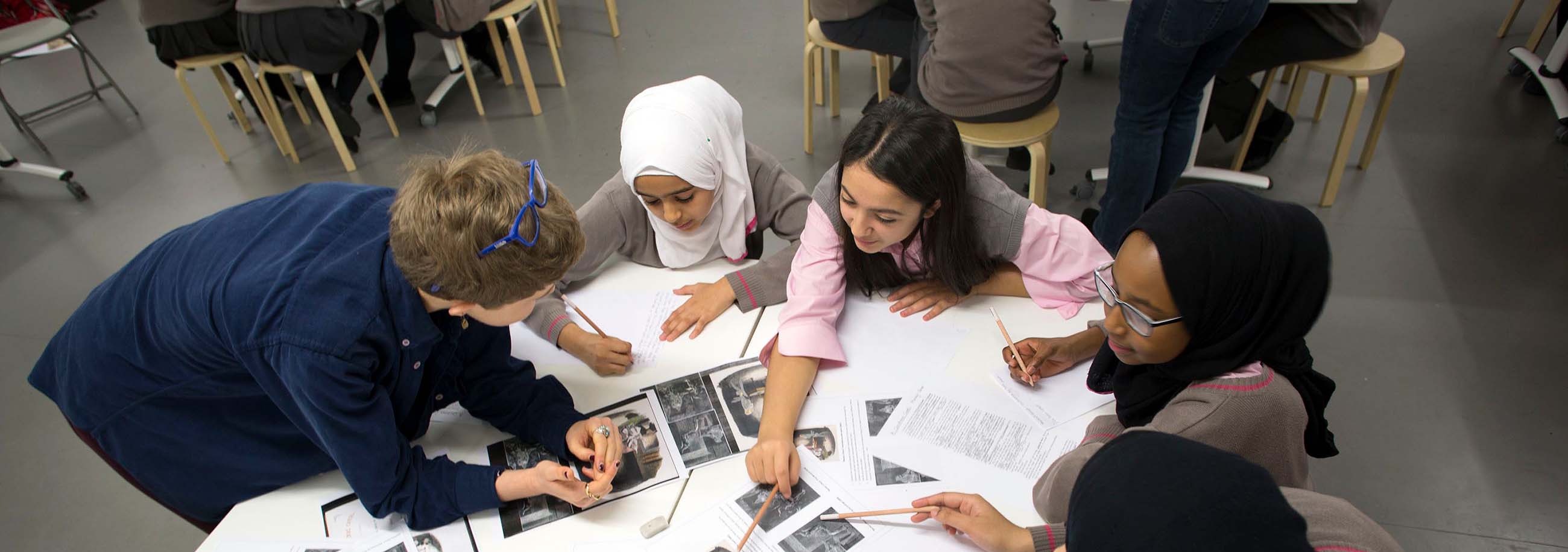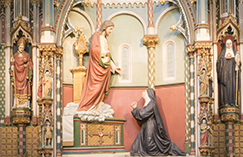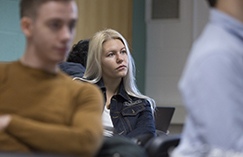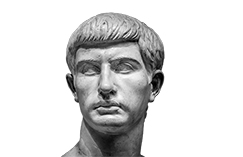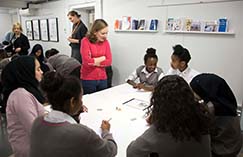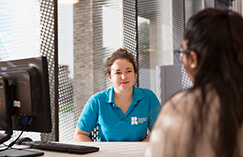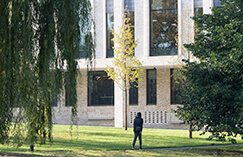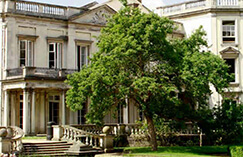Our School Sessions
We can design a bespoke 45 – 60 minute session for your class in any of the following literary areas:
- Shakespeare
- Black British writing
- The Romantic period
- The Victorian period
- American literature
- The 20th century
- Contemporary literature
- Children's literature
- Popular Literature and Culture
We also offer a valuable career focussed session for students wondering what they can do with an English Literature degree. They will learn that there are many exciting career options, and get the chance to try an activity such as pitching, debating or marketing.
Examples of Off the Shelf Sessions
We can deliver any of the sessions below to your students, all of which are based on actual lectures delivered to undergraduate students, but tailored to either GCSE or A level students.
Chaucer
Gamifying Chaucer (Dr Dustin Frazier Wood)
This session takes a fresh perspective on Chaucer's Canterbury Tales by transforming one of the tales into a role-playing game. As knights, millers, nuns or talking animals become 'characters' with stat points, health levels and powers of magic and persuasion, we can analyse the makeup of their characters and understand what they might have represented for audiences in the later Middle Ages, and what they might mean today. By transforming the plot of a tale into a turn-based, role-playing narrative, we can better understand how its plot works and where its most important moments lie . . . and how those moments make their tale's meaning.
Shakespeare and Other Drama
Who Wants to play Othello? (Professor Jane Kingsley-Smith)
The question of who should play Othello has a long and fraught racial history. It's only forty years ago that Anthony Hopkins, a white actor, blacked up to play him on TV, though that would be unthinkable now. In this session, we'll think about the history of casting Othello, and the question of whether a black actor 'should' play Othello, that is, whether or not they would be reinforcing racial stereotypes that the play can be seen to perpetuate. We'll then think more generally about how desirable the role of Othello is. Is he really the hero of his own tragedy? Wouldn't it be better to play Iago? Get ready to debate in class which part is better.
Mediating Madness: Character and Dramatic Form in Peter Shaffer’s Amadeus (Dr Ian Kinane)
In this session, we will look at elements of character and dramatic form in Peter Shaffer’s multi-award-winning play Amadeus. We will explore the relationship between madness and artistic genius in the figure of Mozart, and we will question the extent to which, in Salieri’s manipulative “gaslighting” of Mozart, the play itself can be read as a metaphoric “godgame”, a study of life itself. Participants will also get to enact their own “godgame” by designing a production of the play – which will enable them to think about elements of set/staging, costume, lighting, and special effects – using the 1984 film Amadeus, the 2018 National Theatre revival production, and even the 1985 Falco hit “Rock Me Amadeus” for inspiration.
Nineteenth Century Prose
Frankenstein's 'Monster' (Dr Mary Shannon)
Think you know the story of Frankenstein and his Creature? This session uses illustration to look again at how we can close read Mary Shelley's gothic tale. Get ready to do some drawing as well as some literary analysis, as we rethink what it means to be human and what it means to be 'monstrous'.
Twentieth Century Prose
“You’ll Believe God is a Woman”: Religion and Female Freedom/Oppression in Barbara Kingsolver’s The Poisonwood Bible (Dr Ian Kinane)
In this session, we will examine the relationship between gender, race, and nationhood in Barbara Kingsolver’s The Poisonwood Bible. Using Ariana Grande’s song “God is a Woman” as a focaliser, we will explore the relationship between religion and female freedom/oppression. We will look in depth at the study of character in the novel, examining, among other things, the multiplicity of female voices and religious experiences within the text, the possibilities for hybrid racial, cultural, and national identities in Leah and Anatole’s relationship, and the symbolic importance of Adah’s disability in the novel’s construction of a postcolonial Africa.
Language, Race, Identity: Jean Rhys’ Wide Sargasso Sea, Charlotte Brontë’s Jane Eyre, and Rihanna’s “Work” (Dr Ian Kinane)
In this session, we will explore the ways in which Jean Rhys’ novel Wide Sargasso Sea is an important work of postcolonial fiction, writing back against the canonical British novel Jane Eyre, written by Charlotte Brontë over 100 years before. We’ll look at questions of race and racial identity – both in relation to Antoinette’s perceived identity as a “white cockroach” in Jamaica, as well as the ways in which Rhys looks back to Brontë’s character, Bertha Mason, as a classic example of the racialised ‘mad woman in the attack’. Finally, we will examine important thematic and symbolic elements of Rhys’ novel (such as language and clothing), using the song “Work” by Rihanna ft. Drake to help us understand its racial context.
Creative Writing and Media Studies
Dancing with the dictionary: (Dr Tim Atkins)
Many of the most enjoyable, original, and exciting moments in modern writing come when an author makes creative use of the dictionary. We'll look at how to play with synonyms, antonyms, and leaps in to and out of the dictionary to provide the inspiration for new texts, to revise existing ones, and to think about the processes of creativity and how we make use of them.
Character + Setting + Problem = Story: (Dr Tim Atkins)
In this workshop we'll look at the basics of creating stories. We'll examine the mechanics of creating exciting and compelling plots and will then use that knowledge to make our own outline of a brilliant story. If you sell your story to Hollywood I want 10% of the profits!
Interactive Fiction Workshop (Dr Dustin Frazier Wood)
In this workshop we will use the online platform Twine to write our own interactive hypertext short story. We'll consider how to use suspense, how to create overlapping narratives, and how to construct characters using dialogue and action rather than description to create engaging literary works. Along the way we'll discuss how interactive fiction writing relates to literary studies, social media and video game design.
Writing for the Screen (Dr Tony Paraskeva)
In this workshop we will write the outline of our own short film or TV script. We will think about our favourite stories, characters and genres, and use our imaginations to think about how dramatic scenes are based on dialogue, action and image. Inspiration may begin with a character, a world, a theme, or a plot. We will develop ideas from concept to pitch to outline.
Literature and Media (Dr Tony Paraskeva)
This session will explore the relation between literary texts and other media, including cinema, television, social media and gaming. We will consider how literature belongs to a wider ‘media ecology’, and how texts often borrow from, allude to and appropriate the forms and content in movies, the internet, virtual reality and other forms of new media.
Other Sessions we can Offer
Fantasy Worlds: Medieval Literature, Present and Future (Dr. Dustin Frazier Wood)
London: Cultural Heritage Past, Present and Future (Dr. Dustin Frazier Wood)
Strictly Come Dancing: Analysing Dance in Zadie Smith's Swing Time (Dr. Alberto Fernandez-Carbajal)
Seven Basic Plots: Playing with the ways that stories work (Dr. Tim Atkins)
Wreck this text: Read better through creative editing (Dr. Tim Atkins)
Well-being & Creative Attention: ways of writing about the world and ourselves to increase well-being (Dr. Tim Atkins)
Visual Storytelling (Dr. Tony Paraskeva)
Writing from Life
Writing from Life (Dr Jerome Boyd Maunsell)
In this workshop we will think about how to transform the raw material of our own lives into stories and narratives. We will explore how to use our own memories as a creative tool for writing fiction and creative nonfiction. We’ll consider the boundaries and the differences between fact and fiction, and the creative possibilities this opens up for writing in several different forms.
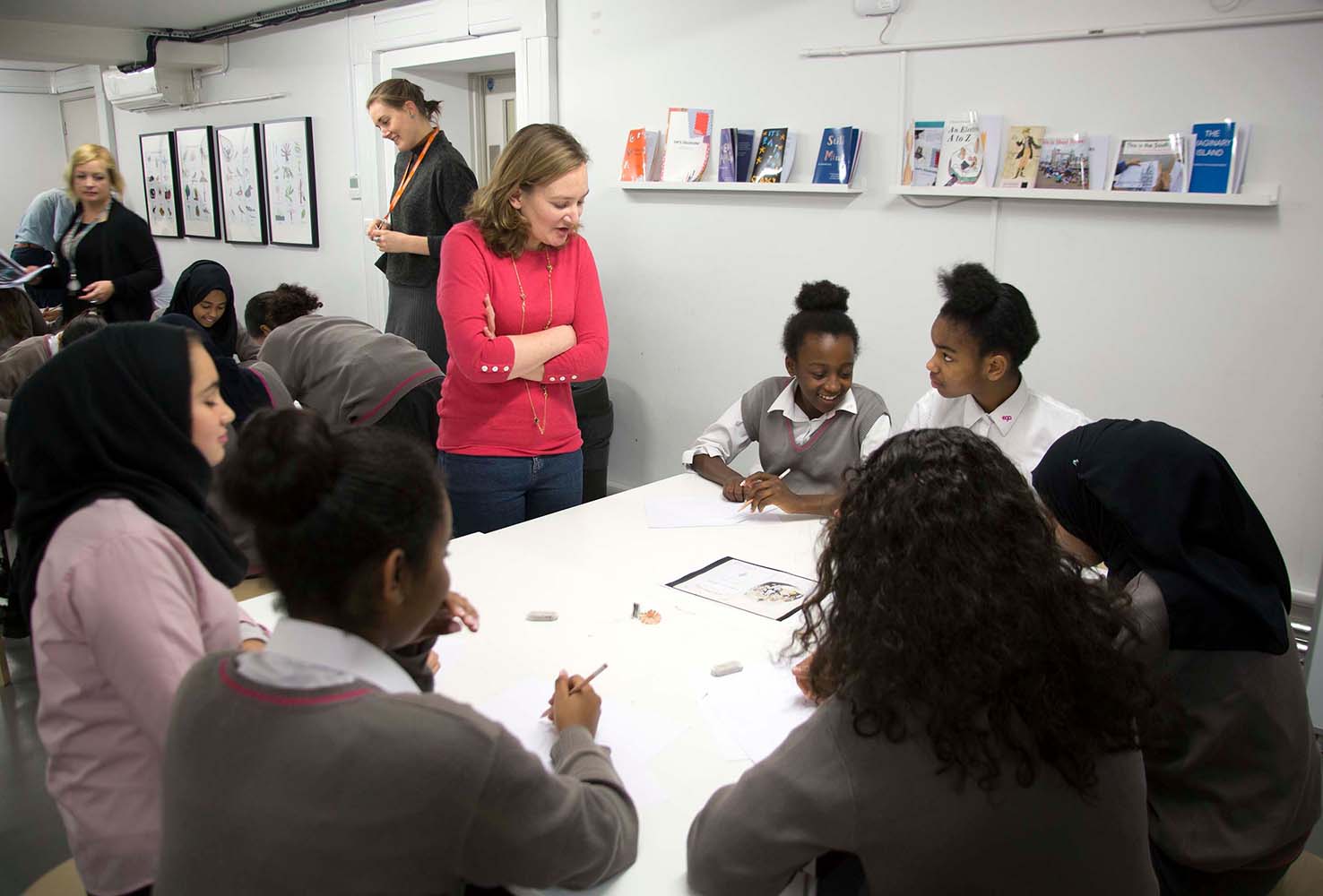
Professional Development Sessions for Teachers
Roehampton’s English and creative writing academics have also devised a series of 60 minute professional development workshops for teachers of KS3 and KS4 English, both in person and virtually. These interactive sessions will be delivered by a specialist in the field and are a fantastic way to diversify and add variety to the curriculum. Participants will also receive a learning resource pack including fun, interactive lesson plans.
Sessions offered to teachers include:
• Shakespeare: Othello and Macbeth
• Reading Poetry, Hearing Voices: approaches to teaching poetry
• Jane Eyre and approaches to nineteenth century prose
• Lord of the Flies and approaches to the contemporary novel
• Creative Reading and Creative Writing
To plan your teacher event please email our School Liaison team school.liaison@roehampton.ac.uk or call Senior Recruitment Officer Kieron Bird on 0208 392 8127.
